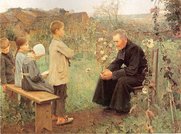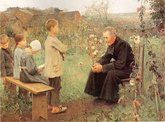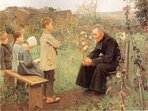 The Heidelberg Catechism: Lord's Day 30 80. Question: What difference is there between the Lord's supper and the papal mass? Answer: The Lord's supper testifies to us, first, that we have complete forgiveness of all our sins through the one sacrifice of Jesus Christ, which He Himself accomplished on the cross once for all;[1] and, second, that through the Holy Spirit we are grafted into Christ,[2] who with His true body is now in heaven at the right hand of the Father,[3] and this is where He wants to be worshipped.[4] But the mass teaches, first, that the living and the dead do not have forgiveness of sins through the suffering of Christ unless He is still offered for them daily by the priests; and, second, that Christ is bodily present in the form of bread and wine, and there is to be worshipped. Therefore the mass is basically nothing but a denial of the one sacrifice and suffering of Jesus Christ, and an accursed idolatry. [1] Matt. 26:28; John 19:30; Heb. 7:27; 9:12, 25, 26; 10:10-18. [2] I Cor. 6:17; 10:16, 17. [3] Joh. 20:17; Acts 7:55, 56; Heb. 1:3; 8:1. [4] John 4:21-24; Phil. 3:20; Col. 3:1; I Thess. 1:10. 81. Question: Who are to come to the table of the Lord? Answer: Those who are truly displeased with themselves because of their sins and yet trust that these are forgiven them and that their remaining weakness is covered by the suffering and death of Christ, and who also desire more and more to strengthen their faith and amend their life. But hypocrites and those who do not repent eat and drink judgment upon themselves.[1] [1] I Cor. 10:19-22; 11:26-32. 82. Question: Are those also to be admitted to the Lord's supper who by their confession and life show that they are unbelieving and ungodly? Answer: No, for then the covenant of God would be profaned and His wrath kindled against the whole congregation.[1] Therefore, according to the command of Christ and His apostles, the Christian church is duty-bound to exclude such persons by the keys of the kingdom of heaven, until they amend their lives. [1] Ps. 50:16; Is. 1:11-17; I Cor. 11:17-34.
0 Comments
 The Heidelberg Catechism: Lord's Day 29 78. Question: Are then the bread and wine changed into the real body and blood of Christ? Answer: No. Just as the water of baptism is not changed into the blood of Christ and is not the washing away of sins itself but is simply God's sign and pledge,[1] so also the bread in the Lord's supper does not become the body of Christ itself,[2] although it is called Christ's body[3] in keeping with the nature and usage of sacraments.[4] [1] Eph. 5:26; Tit. 3:5. [2] Matt. 26:26-29. [3] I Cor. 10:16, 17; 11:26-28. [4] Gen. 17:10, 11; Ex. 12:11, 13; I Cor. 10:3, 4; I Pet. 3:21. 79. Question: Why then does Christ call the bread His body and the cup His blood, or the new covenant in His blood, and why does Paul speak of a participation in the body and blood of Christ? Answer: Christ speaks in this way for a good reason: He wants to teach us by His supper that as bread and wine sustain us in this temporal life, so His crucified body and shed blood are true food and drink for our souls to eternal life.[1] But, even more important, He wants to assure us by this visible sign and pledge, first, that through the working of the Holy Spirit we share in His true body and blood as surely as we receive with our mouth these holy signs in remembrance of Him,[2] and, second, that all His suffering and obedience are as certainly ours as if we personally had suffered and paid for our sins.[3] [1] John 6:51, 55. [2] I Cor. 10:16, 17; 11:26. [3] Rom. 6:5-11.  The Heidelberg Catechism: Lord's Day 28 75. Question: How does the Lord's Supper signify and seal to you that you share in Christ's one sacrifice on the cross and in all His gifts? Answer: In this way: Christ has commanded me and all believers to eat of this broken bread and drink of this cup in remembrance of Him. With this command He gave these promises:[1] First, as surely as I see with my eyes the bread of the Lord broken for me and the cup given to me, so surely was His body offered for me and His blood poured out for me on the cross. Second, as surely as I receive from the hand of the minister and taste with my mouth the bread and the cup of the Lord as sure signs of Christ's body and blood, so surely does He Himself nourish and refresh my soul to everlasting life with His crucified body and shed blood. [1] Matt. 26:26-28; Mark 14:22-24; Luke 22:19, 20; I Cor. 11:23-25. 76. Question: What does it mean to eat the crucified body of Christ and to drink His shed blood? Answer: First, to accept with a believing heart all the suffering and the death of Christ, and so receive forgiveness of sins and life eternal.[1] Second, to be united more and more to His sacred body through the Holy Spirit, who lives both in Christ and in us.[2] Therefore, although Christ is in heaven[3] and we are on earth, yet we are flesh of His flesh and bone of His bones,[4] and we forever live and are governed by one Spirit, as the members of our body are by one soul.[5] [1] John 6:35, 40, 50-54. [2] John 6:55, 56; I Cor. 12:13. [3] Acts 1:9-11; 3:21; I Cor. 11:26; Col. 3:1. [4] I Cor. 6:15, 17; Eph. 5:29, 30; I John 4:13. [5] John 6:56-58; 15:1-6; Eph. 4:15, 16; I John 3:24. 77. Question: Where has Christ promised that He will nourish and refresh believers with His body and blood as surely as they eat of this broken bread and drink of this cup? Answer: In the institution of the Lord's supper: The Lord Jesus on the night when He was betrayed took bread, and when He had given thanks, He broke it and said, "This is my body which is for you. Do this in remembrance of me." In the same way also the cup, after supper, saying, "Do this, as often as you drink it, in remembrance of me." For as often as you eat this bread and drink the cup, you proclaim the Lord's death until He comes (I Corinthians 11:23-26). This promise is repeated by Paul where he says: The cup of blessing which we bless, is it not a participation in the blood of Christ? The bread which we break, is it not a participation in the body of Christ? Because there is one bread, we who are many are one body, for we all partake of the one bread (I Corinthians 10:16, 17). |
The Heidelberg
|
 RSS Feed
RSS Feed
